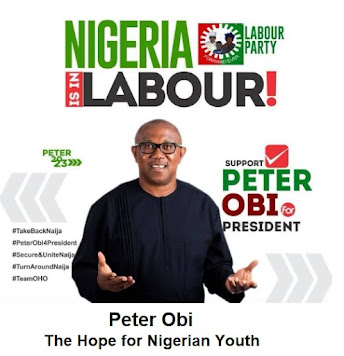Before last Sunday, the rate of my heartbeat had trippled due to anxiety and, yes, fear. Who would blame me? Anambra State is one of the 36 states of Nigeria. She has over 9 millions people (and these are just those physically living there). But the last governorship elections officially registered 24 money-bags as contestants - including the incumbent, Peter Obi.
Before the elections which took place on Saturday, there were reports of shortage of ballot papers, litigations and counter litigations, some political groups planning to rig the elections, some political hirelings threatening violence and mayhem if their preferred candidates failed to win, threats of sabotage and destruction of life and property should certain candidates won, and so on. In the light of such stories, you must appreciate and understand my relief at the publication of the results last Sunday without a reported loss of life!
But, let us put the results of the elections in t
 heir proper context. Anambra State has been riddled with all sorts of polical and legal wrangling since its creation. These took a terribly ugly configuration when the former governor, Chris Ngige was almost hounded out of office culminating in the torching of some governement offices and documents by some polical gangs allegedly sponsored by one of the current contestants. It was nothing short of a political coup d'etat! In fact, some political commentators allege that there was a grand design from forces outside the state to make sure that the state does not have peace.
heir proper context. Anambra State has been riddled with all sorts of polical and legal wrangling since its creation. These took a terribly ugly configuration when the former governor, Chris Ngige was almost hounded out of office culminating in the torching of some governement offices and documents by some polical gangs allegedly sponsored by one of the current contestants. It was nothing short of a political coup d'etat! In fact, some political commentators allege that there was a grand design from forces outside the state to make sure that the state does not have peace.A conscientious analysis of these events does not conjure a beautiful picture of the state politically. It is from this perspective therefore that one should appreciate and commend the timely intervention of the Vice President, Goodluck Jonathan in congratulating Mr Obi for emerging victorious. Jonathan's message has a lot of implications and can be subject to many interpretations. Foremost among them is the fact that since he shares the same political party with Chukwuma Soludo (one of the frontline candidates), one can conclude that his party, the PDP, has spoken. Which then implies that PDP (and by extension, Soludo) has accepted Obi's election as the will of the people. In which case, we are not expecting either Soludo or PDP to contest the results of the elections in the law courts (or the electoral tribunal).
I am aware that the electoral process was badly flawed with a basketful of problems, including logistical ones occasioned by the fact that some polling stations did not open on time; and even some of those that did, there were not enough voting materials; and so forth. Furthermore, there was the apathy issue brought about by disaffection and lack of trust on both the political class and the electoral process. No wonder then that out of over 5 million elegible voters, only 301, 232 votes were cast.
I can understand why some people have lost confidence in the electoral process in Nigeria. Nigeria is the only multi-party-structured country where some states can have 100 percent of one political party in their houses of assembly each of which comprises over 300 legislators. To add some more meat to this fact, I recently travelled to Onitsha from Enugu by road. The elderly driver who took me and one other passenger (who happened to be a politician) in his car was so disenchanted with politics in Anambra State (nay Nigeria) that he vowed to stay at home on the voting day. "I will simply ask my wife to prepare a pot of ofe onugbu (bitter leaf soup) and a bowl of pounded yam to keep us happy throughout the day", he told me.
On leaving Enugu, we started seeing bill board adverts of the candidates. The driver opened up, telling me stories of each of the governorship aspirants as we approached their adverts. Most of his stories were neither positive nor publishable, ranging from fraud, indidelity, deceit, political brigandage, and in extreme cases, killing. Only one or two of the contestants escaped the driver's vituperations. I tried convincing him to change his mind about staying at home on polling day, but he would have none of it. I can now understand why people say that the cab driver (like the palm wine tapper) is a custodian of information!
People must look at the big picture in order to correctly interpret the Anambra elections. The state has shown that democracy can and should work in Nigeria. Of course, Mr Obi may have been elected by an infinitesimal minority of voters (97,843 votes of the total 301, 232 votes cast) and in a state of over 5 million voters). But measuring the level of freedom exercised by the voters and, to a large extent, the level of fairness that characterised the polls, one can comfortably conclude that a good foundation has been laid for future Nigierian electoral processes. If the Anambra example were to be replicated in all other parts of Nigeria, more and more people like my driver friend would be convinced to cast their votes in future.




